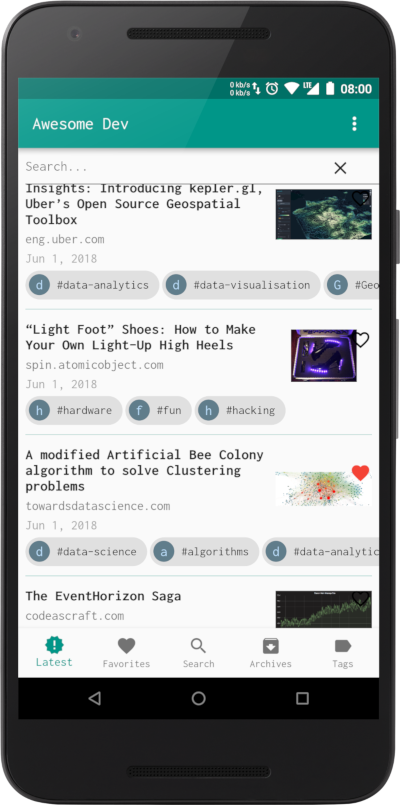Dev Feed is a Flutter-based mobile application allowing to keep up with top engineering content from companies all over the world. It stemmed from my own needs to not only follow a curated list of tech-related blogs, but also play a little bit with the excellent Flutter SDK.
The tech stack is rather simple:
- Backend
- A Spring Boot application written in Kotlin, which contains scheduled crawlers in charge of analyzing certain remote websites for articles and feeding a local database. It then aggregates and exposes such data over a GraphQL API, with the ability to search for articles, or by tags, or to read past articles. This Backend application is published to the Docker Hub, and continuously deployed to Render as well. At the moment, articles are fetched from the list below, but additional sources may be added later on:
- DiscoverDev.io
- EngineeringBlogs.xyz
- my own blog, located at rm3l.org
- A Spring Boot application written in Kotlin, which contains scheduled crawlers in charge of analyzing certain remote websites for articles and feeding a local database. It then aggregates and exposes such data over a GraphQL API, with the ability to search for articles, or by tags, or to read past articles. This Backend application is published to the Docker Hub, and continuously deployed to Render as well. At the moment, articles are fetched from the list below, but additional sources may be added later on:
- Mobile
A Docker repository with the GraphQL API Server can be found here: https://hub.docker.com/r/rm3l/dev-feed-api
To fetch the docker image, run:
docker image pull rm3l/dev-feed-apiTo run the server with the default options and expose it on port 8080:
docker container run --rm -p 8080:8080 rm3l/dev-feed-apiYou can then access the GraphiQL browser by heading to http://localhost:8080/graphiql
The Backend API is also published to my Helm Charts repository, so as to be deployable to a Kubernetes Cluster using Helm.
It is listed on Artifact Hub : https://artifacthub.io/packages/helm/rm3l/dev-feed
$ helm repo add rm3l https://helm-charts.rm3l.org
$ helm install my-dev-feed rm3l/dev-feedSee https://artifacthub.io/packages/helm/rm3l/dev-feed or https://github.com/rm3l/helm-charts/blob/main/charts/dev-feed/README.md for all customizable values.
You can then access the GraphiQL browser by heading to http://localhost:8080/graphiql
- Build the Backend
./backend/gradlew -p ./backend build --stacktrace- Run the Backend GraphQL API
java -jar backend/api/build/libs/dev-feed-api-2.0.1.jarYou can then access the GraphiQL browser by heading to http://localhost:8080/graphiql
-
Install Flutter by following the instructions on the official website
-
Prepare the configuration environment
Skip this to use the default Render Backend. Otherwise, if you have a custom Backend (either local or remote), you need to create a specific environment file (say my_personal_backend.dart) in the mobile/lib/environments folder, e.g.:
import 'package:dev_feed/env.dart';
void main() => MyPersonalBackend();
class MyPersonalBackend extends Env {
final String baseUrl = 'https://my-dev-feed-backend-api.example.org';
}- Build the mobile apps
First cd to the mobile directory:
cd mobileIf you simply want to target the default Render backend, just run:
flutter build apk --debugOtherwise, if you have a custom Backend (and its related Dart environment file) declared under mobile/lib/environments/my_personal_backend.dart, then run:
flutter build apk --debug -t lib/environments/my_personal_backend.dartYou will then find the mobile applications built under the respective platform folders. For example, the APK for Android can be found under build/app/outputs/apk/debug/.
- Install and run the APK either in an emulator or in a real device
flutter installOr:
adb install -r build/app/outputs/apk/debug/app-debug.apkContributions and issue reporting are more than welcome. So to help out (e.g., with a new Article crawler plugin in the Backend), do feel free to fork this repo and open up a pull request. I'll review and merge your changes as quickly as possible.
You can use GitHub issues to report bugs. However, please make sure your description is clear enough and has sufficient instructions to be able to reproduce the issue.
- Armel Soro
The MIT License (MIT)
Copyright (c) 2019-2022 Armel Soro
Permission is hereby granted, free of charge, to any person obtaining a copy
of this software and associated documentation files (the "Software"), to deal
in the Software without restriction, including without limitation the rights
to use, copy, modify, merge, publish, distribute, sublicense, and/or sell
copies of the Software, and to permit persons to whom the Software is
furnished to do so, subject to the following conditions:
The above copyright notice and this permission notice shall be included in all
copies or substantial portions of the Software.
THE SOFTWARE IS PROVIDED "AS IS", WITHOUT WARRANTY OF ANY KIND, EXPRESS OR
IMPLIED, INCLUDING BUT NOT LIMITED TO THE WARRANTIES OF MERCHANTABILITY,
FITNESS FOR A PARTICULAR PURPOSE AND NONINFRINGEMENT. IN NO EVENT SHALL THE
AUTHORS OR COPYRIGHT HOLDERS BE LIABLE FOR ANY CLAIM, DAMAGES OR OTHER
LIABILITY, WHETHER IN AN ACTION OF CONTRACT, TORT OR OTHERWISE, ARISING FROM,
OUT OF OR IN CONNECTION WITH THE SOFTWARE OR THE USE OR OTHER DEALINGS IN THE
SOFTWARE.





